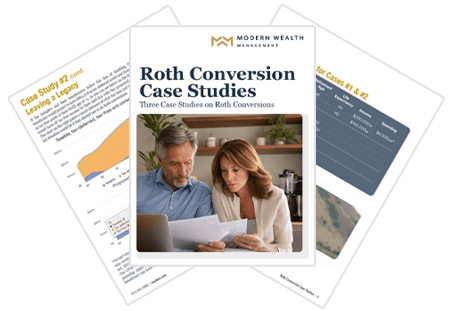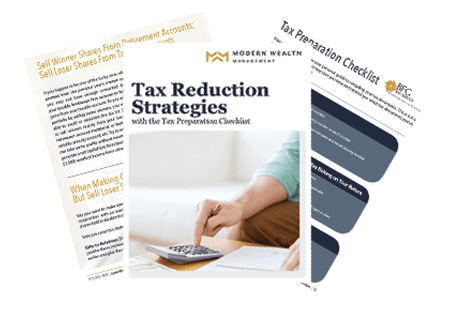How Do I Pay Less Taxes?
Key Points – How Do I Pay Less Taxes?
- Don’t Be Shortsighted When Thinking About How to Pay Less Taxes
- Our CPAs Aren’t Solely Focused on Tax Compliance
- Working with a CFP® Professional and CPA Relationship That Work Together Is Critical to Paying Less Taxes
- The Difference Between Tax Compliance and Forward-Looking Tax Planning
- 6 Minutes to Read | 23 Minutes to Watch
How Do I Pay Less Taxes?
Many taxpayers feel like they have paid their fair share in taxes. And in some cases, far more than their fair share. So, how do you pay less taxes? This line of thinking can cause people to be very shortsighted when it comes to reducing their tax bill.
Schedule a Meeting Get the Retirement Plan Checklist
Why Most CPAs Can’t Help You Pay Less Taxes
The typical CPA is faced with the difficult task of finding ways to save you money on your current tax returns. The problem with that methodology is that it’s too late! At this point, all your taxable income and investment assets have made their money. Because of that, it’s almost impossible for the CPA to affect the amount of taxes needing to be paid.
To reduce taxes, your CPA needs to be projecting into the future, several years down the road. They need to understand every part of your financial life. It’s not only about the assets you have; it’s also about what purchases you want to make in retirement.
CPAs Working with Financial Planners
A good CPA working with a good financial planner can help you make sure that you are putting money into the right accounts while you’re working AND creating the proper distribution strategy to maximize your tax strategy throughout your retirement years. No one strategy is right for everyone, and there are no two cases that are the same. You will have different amounts of money, different amounts of income, and various spending goals for the future.
Additionally, what most taxpayers don’t realize is most CPAs will merely do tax compliance. Tax compliance is defined as making tax payments and producing and submitting information to the tax authorities on time and in the required formats. In other words, they would prepare it with only compliance and IRS guidelines in mind, and with no thought of future tax reduction strategies.
Looking Ahead to 2026
After filing 2023 taxes, it’s probably easy for a lot of people to not want to think about taxes again until it’s time to prepare their 2024 return. But now in particular is an essential time to have a forward-looking tax plan. That’s because tax rates are set to go up after parts of the Tax Cuts and Jobs Act sunsets after December 31, 2025.1 The sunsetting of the TCJA would revert tax rates to the higher rates from 2017.
It’s important to always consider your current tax rate compared to your future tax rate when determining how to pay less taxes. Through 2025, tax rates will be at 10%, 12%, 22%, 24%, 32%, 35%, and 37%. But starting in 2026, tax rates would be 10%, 15%, 25%, 28%, 33%, 35%, and 39.6% unless Congress steps in to keep the TCJA from sunsetting.2
If tax rates go up, it’s critical to realize that you’ll be moving faster through the marginal tax brackets. In other words, the amount that you need to earn to get to those higher rates goes down. One of our managing directors, Dean Barber, calls it “a double whammy.”
Tax Planning Strategies to Consider
So, how can you pay less taxes despite these potential tax law changes? One strategy that many Modern Wealth clients are utilizing to pay less taxes over time is known as a Roth conversion. This process involves converting funds from a traditional IRA into a Roth IRA.
With traditional IRAs, you aren’t required to pay tax on the funds within the account until withdrawing them. It’s the exact opposite with Roth IRAs. With Roth IRAs, you’re taxed on the contribution, but the earnings and distributions that follow are tax-free. When doing a Roth conversion, you’re required to pay tax on the funds that you’re converting.
While Roth conversions require you to pay the tax up front, don’t forget about these potential tax law changes that could go into effect in 2026. Doing a Roth conversion now at today’s lower rates allows you to capture tax-free growth if those tax law changes take place as planned. If you have a lot of money in traditional IRAs, keep in mind that you could be taxed at rates that are higher than the current rates if you’re taking distributions after 2025.
Roth Conversions Can Help People Pay Less Taxes … But They Could Make People Pay More Taxes in Certain Circumstances
It’s hard to argue with the tax-free growth from Roth accounts, especially in retirement when you’re no longer receiving a paycheck. But it’s no guarantee that Roth conversions will help you pay less in taxes over time. Doing too big of a conversion could throw you into a higher tax bracket.
If you’re considering Roth conversions, it’s critical to consult a tax professional before doing so. We also encourage you to download a copy of our Roth Conversion Case Studies. It includes three case studies—two instances of where it makes sense for a couple to do a Roth conversion and one instance where it doesn’t make sense. Download your copy below.

Creating Tax Diversification
There are several benefits of owning Roth accounts, but it isn’t advisable to have all your money in tax-free accounts (or tax-deferred or taxable accounts). Rather than putting all your eggs in one tax basket, it’s important to create tax diversification.
Let’s say that you have saved $1.5 million for retirement and you’re spreading your money evenly between tax-deferred, tax-free, and taxable accounts. By spending down some of the money from each tax bucket, you can get more income and pay less taxes in the process. The only bucket that would be 100% taxable would be your tax-deferred traditional IRAs.
Along with keeping some money in tax-deferred accounts to do Roth conversions, you may want to have funds in traditional IRAs to make Qualified Charitable Distributions (QCDs). If you’re 70½ or older, you can donate up $100,000 from directly from your traditional IRA to a qualified charity for the 2023 tax year without it showing up on your tax return. That amount goes up to $105,000 a year beginning with the 2024 tax year due to a provision from the SECURE Act 2.0.3
Reducing or Eliminating RMDs
QCDs also can help reduce your Required Minimum Distributions (RMDs). An RMD is the minimum amount of money that you have to take out of your IRA on an annual basis. Another provision of SECURE 2.0 moved the RMD age from 72 to 73 as of January 2023. It’s set to move up to 75 by 2033.4
There are penalties for missed RMDs,5 so it’s important to understand the rules you need to follow for taking them. Keep in mind that there are no RMDs for Roth IRAs. Inherited Roth IRAs are an exception to that, though. You’ll still need to take RMDs if you inherit a Roth IRA, but the distributions will likely be tax-free.
The Bottom Line with How to Pay Less Taxes
From tax-loss (or tax-gain) harvesting to understanding how much of your Social Security can become taxable, there are many other things to keep in mind when determining how to pay less taxes. To learn more about forward-looking tax planning strategies, download a copy of our Tax Reduction Strategies guide below.

The bottom line is to not get shortsighted with trying to pay less taxes. Rather than just focusing on paying less taxes today, look to the future and understand that taxes will always be a fact of life. If you know this and plan for it, that can go a long way toward making sure you’re not paying more than you owe in taxes.
It is imperative that your forward-looking tax plan is kept up-to-date through ongoing conversations between your financial advisor and your CPA. It is also vital that you give total transparency to these professionals so that they can do their job to the best of their ability. Appropriately done, proactive, forward-looking tax planning can have an enormous impact on the amount of taxes you pay over your lifetime.
Let’s Build a Plan That Helps You Pay Less Taxes
If you have questions about how our CPAs and CFP® Professionals work together to build a forward-looking tax plan within a personalized financial plan, start a conversation with our team below.
Paying more taxes can lead to a great deal of financial stress, which can lead to rushed emotional decisions. Working with a team of wealth management professionals is key so that you pay less taxes over your lifetime and are making well-informed decisions. We’re ready to build you a plan that allows you to have more confidence that you’re doing the right things with your money, freedom from financial stress, and time to spend doing the things you love.
How Do I Pay Less Taxes?: Watch Guide
00:00 – Introduction
00:44 – It’s Tax Day!
01:27 – Understanding the Tax Code
03:12 – Roth vs. Traditional 401k
08:45 – Paying Less Taxes in Retirement
15:31 – Tax-Efficiency Between Generations
22:22 – What We Learned Today
Articles
- 9 Tax Filing Errors to Avoid
- Tax Planning Strategies with Marty James, CPA, PFS
- Tax Planning Case Study
- Nonfinancial Life Planning with Bruce Godke
- The CFP® Professional and CPA Relationship with Logan DeGraeve, CFP® and Corey Hulstein, CPA
- Tax Planning During Tax Preparation Season with Corey Hulstein, CPA
- Retirement Planning 101: Back to the Basics with Chris Rett, CFP®, AIF®
- Setting Up a Spending Plan for Retirement
- What If We Go Back to Old Tax Rates?
- Tax Rates Sunset in 2026 and Why That Matters
- 2024 Tax Brackets: IRS Makes Inflation Adjustments
- What Is Tax Diversification?
- Understanding the SECURE Act 2.0 with Ed Slott, CPA
- RMD Questions: What Are Required Minimum Distributions?
- Components of a Complete Financial Plan with Logan DeGraeve, CFP®, AIF®
- Why You Need a Financial Planning Team with Jason Gordo
Past Shows
- 5 Tax Secrets Retirees Need to Know
- What Is Tax Planning?
- 5 Long-Term Strategies for a Better Retirement
- Where Should I Be Saving for Retirement?
- 7 Retirement Strategies to Retire Successfully
- 4 Things Most Retirees Aren’t Doing (But Should Be Doing)
- Roth Conversion Rules
- Converting to a Roth IRA: What Are the Pros and Cons?
- How Does a Roth IRA Grow?
- What Is a QCD? Qualified Charitable Distribution
- How to Reduce RMDs with 5 Strategies
- RMD Age for 2023: What’s Your Required Beginning Date?
- Rules for Inherited IRA Distributions
Downloads
Other Sources
[1] https://taxfoundation.org/blog/tcja-expiring-means-for-you/
[3] https://www.schwabcharitable.org/giving-with-ira
[4] https://www.nstp.org/article/secure-act-2-0-%E2%80%93-when-does-the-rmd-start
Investment advisory services offered through Modern Wealth Management, LLC, an SEC Registered Investment Adviser.
The views expressed represent the opinion of Modern Wealth Management an SEC Registered Investment Adviser. Information provided is for illustrative purposes only and does not constitute investment, tax, or legal advice. Modern Wealth Management does not accept any liability for the use of the information discussed. Consult with a qualified financial, legal, or tax professional prior to taking any action.